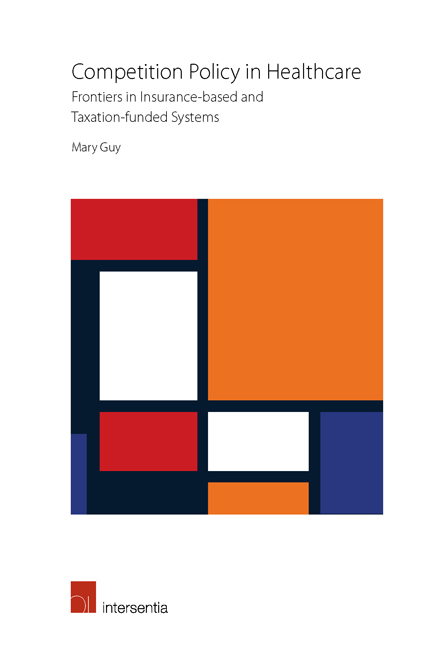Book contents
- Frontmatter
- Foreword
- Preface
- Acknowledgements
- Contents
- List of Cases
- List of Legislation
- Table of Figures
- Abbreviations
- Introduction
- Chapter 1 Competition Reforms in Dutch and English Healthcare and the Development of Competition Policy
- Chapter 2 Competition Law: Its Applicability and Application in Dutch and English Healthcare
- Chapter 3 Sectoral Regulation: The Relationship between the Competition Authority and the Healthcare Regulator in the Netherlands and England
- Chapter 4 Merger Control: Hospital Mergers, General Merger Control and the Development of ‘Healthcare-Specific’ Merger Control in the Netherlands and England
- Conclusion
- Bibliography
- Index
- About the Author
Chapter 1 - Competition Reforms in Dutch and English Healthcare and the Development of Competition Policy
Published online by Cambridge University Press: 30 March 2019
- Frontmatter
- Foreword
- Preface
- Acknowledgements
- Contents
- List of Cases
- List of Legislation
- Table of Figures
- Abbreviations
- Introduction
- Chapter 1 Competition Reforms in Dutch and English Healthcare and the Development of Competition Policy
- Chapter 2 Competition Law: Its Applicability and Application in Dutch and English Healthcare
- Chapter 3 Sectoral Regulation: The Relationship between the Competition Authority and the Healthcare Regulator in the Netherlands and England
- Chapter 4 Merger Control: Hospital Mergers, General Merger Control and the Development of ‘Healthcare-Specific’ Merger Control in the Netherlands and England
- Conclusion
- Bibliography
- Index
- About the Author
Summary
The Introduction to this book set out an overview of some of the general tensions and controversies which can arise in introducing competition reforms in healthcare. This chapter builds on that discussion by examining in more detail the Dutch and English competition reforms and the associated legislation and development of guidance which can be characterised as ‘competition policy’.
Although there are differences in the ways in which competition develops within insurance-based and taxation-funded healthcare systems, a perhaps surprising common starting-point for the Netherlands and England is the influence of the ‘managed competition’ model developed by the US health economist, Alain Enthoven. In essence, ‘managed competition’ comprises a purchasing strategy to obtain maximum value for consumers using rules for competition. Originally launched in the late 1970s as a means to manage increasing costs and introduce more equity into healthcare access in the United States, the ‘managed competition’ model was set out as a ‘consumer-choice health plan’ comprising two related parts: a financing system and rules to create a socially desirable competition. Whilst both aspects can be considered to find reflection in the Dutch and English competition reforms, this book is concerned primarily with the latter aspect because this underpins ‘competition policy’ in healthcare.
This chapter examines elements of the legacy of the influence of these ideas within Dutch and English healthcare. It takes each country in turn in order to facilitate understanding, and cross-references with subsequent discussions of the book regarding competition law, the relationship between sectoral regulator and competition authority, and merger control.
Section 1 examines the 2006 reforms of Dutch healthcare and considers how competition has developed in the context of introducing mandatory private health insurance, by reference to the overarching concept of the Dutch ‘healthcare triangle’. This enables discussion of the two constituent elements of competition policy in Dutch healthcare.
- Type
- Chapter
- Information
- Competition Policy in HealthcareFrontiers in Insurance-based and Taxation-funded Systems, pp. 19 - 60Publisher: IntersentiaPrint publication year: 2019



